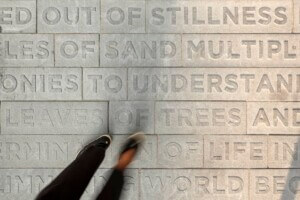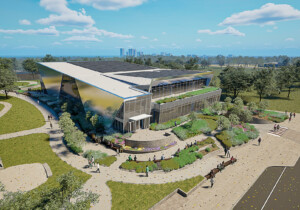Starting today, the City of Chicago is piloting a “Fitbit” for its city streets.
In collaboration with researchers at the Argonne National Laboratory, the University of Chicago, and a few corporations, the city last week installed two of 500 planned sensors for the Array of Things, a project to measure the city’s performance on an array of environmental metrics.
The 10-pound sensors are mounted to light poles and will gather block-level data on noise levels, air quality, air and surface temperature, barometric pressure, vibrations, and atmospheric gasses. Two cameras per box will surveil pedestrian flows, vehicular traffic, sky color, cloud cover, and standing water. The video below gives an overview of the Array of Things and potential applications for the wealth of data the project will generate:
“There are a ton of hit-and-miss experiments being done in cities around the world, but they are not being measured,” Charlie Catlett, lead investigator of the Array of Things, told USA TODAY. “We’re not able to take a success in Chicago and say this is why it succeeds, and this is how you can adapt that to Denver or Los Angeles or New Orleans. I want to see this project help city designers and planners navigate better.”
Data will be instantaneously available to residents online beginning in October. The data, city officials say, could aid infrastructure decisions in the pursuit of Vision Zero goals, or pinpoint areas with poor air quality for intervention. It could also help enable strolling residents avoid desolate blocks or help parents determine how much outdoors time their child with asthma should have. In a city that already has a problem with the gross misuse of cameras, officials addressed the potential for mass surveillance with assurances that the images collected by the devices will be deleted in “tens of minutes.”
The next 48 boxes will be installed by the end of the year, with 450 more coming to the Windy City by 2018. Spurred by a $3.1 million National Science Foundation grant, in the coming years the project will migrate to Seattle, Chattanooga, and Atlanta.










